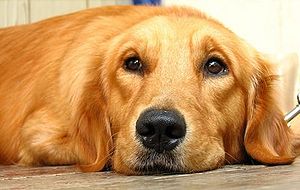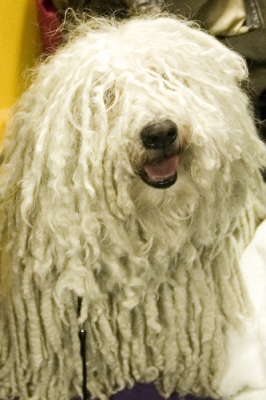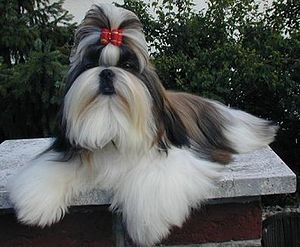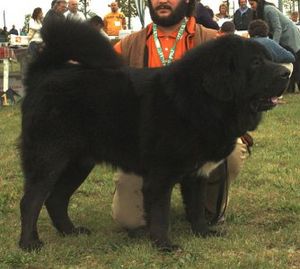 |
| Vital Statistics: |
| Place of Origin: England |
| Group: Sporting dog |
| Height: males 22-24 in., females 21-22 in. |
| Weight: 65-80 lbs., females 55-70 lbs. |
| Life span: 10-12 yrs. |
| Trainability: high |
| Good with children: yes |
| Good with other pets: yes |
The Golden Retriever was bred in the mid-19th century in England with crossings including spaniels, setters, a light-coated retriever.
What does the Golden Retriever look like?
The Golden’s coat is wavy, shiny and feathering. Eyes are dark and ears are medium-sized and hanging down. Colors are cream to shades of gold. The undercoat is water-resistant. The Golden has a powerful muzzle with a scissors bite. Its tail is long, but not curved. Height is about 21-24 inches and weight is 55-80 lbs.
What is the Golden Retriever’s temperament?
The Golden Retriever is sweet and affectionate and patient and gentle with children and can be trusted with infants. They are loving and loyal, well-mannered and intelligent. They learn quickly and try to please the trainer at every step of training. While they may not make good guard dogs, they will bark at approaching visitors.
What are the Golden Retriever’s uses?
The Golden Retriever is prized as a hunting dog, retrieving and tracking. They compete in agility and obedience trials. They are very versatile and are used as therapy and service dogs and guide dogs for the blind. Because of their excellent sense of smell, they have been used in narcotics detection and rescue. The Golden Retriever is an extraordinary companion dog.
What specialty care does a Golden Retriever need?
Typically, the Golden Retriever loves water play. When a Golden Retriever participates in water play, or even has a bath, the combination of their long ears and moisture can commonly lead to yeast infections. This may be easily prevented with a little aftercare. Your veterinarian can supply a solution to be used after each exposure to water, or a couple of times a week. The usage usually consists of applying a few drops of the solution in the ear, and massaging it in.
Possible Health Issues
High incidence of cancer, hip/elbow dysplasia, eye problems, heart disease.
- American Cocker Spaniel
- Barbet
- Boulet Griffon
- Boykin Spaniel
- Bull Terrier
- Clumber Spaniel
- Curly-coated Retriever
- Dalmatian
- English Cocker Spaniel
- English Setter
- English Springer Spaniel
- Flat-coated Retriever
- German Shorthaired Pointer
- Gordon Setter
- Harrier
- Irish Setter
- Irish Water Spaniel
- Kishu Inu
- Kooiker Hound (Kooikerhondje)
- Labrador Retriever
- Lagotto Romagnolo
- Landseer
- Mountain Cur
- Nova Scotia Duck Tolling Retriever
- Otterhound
- Picardy Spaniel
- Poodle
- Pudelpointer
- Redbone Coonhound
- Redtick Coonhound
- Rhodesian Ridgeback
- Spinone Italiano
- Stabyhoun
- Sussex Spaniel
- Telomian
- Treeing Tennessee Brindle
- Vizsla
- Weimaraner
- Welsh Springer Spaniel
- Wirehaired Pointing Griffon
- Wirehaired Styrian Mountain Hound
- Wirehaired Vizsla
- Airedale Terrier
- Beagle
- Bedlington Terrier
- Bluetick Coonhound
- Border Collie
- Border Terrier
- Bull Terrier
- Bulldog
- Bullmastiff
- Ca de Bou
- Cavalier King Charles Spaniel
- Clumber Spaniel
- Collie
- Curly-coated Retriever
- Dandie Dinmont Terrier
- English Cocker Spaniel
- English Foxhound
- English Setter
- English Springer Spaniel
- English Toy Terrier
- Flat-coated Retriever
- Greyhound
- Harrier
- Jack Russell Terrier
- Lakeland Terrier
- Lancashire Heeler
- Llewellyn Setter
- Manchester Terrier
- Mastiff
- Norfolk Terrier and Norwich Terrier
- Old English Sheepdog
- Old English Terrier
- Otterhound
- Parson Russell Terrier
- Shetland Sheepdog
- Smooth and Wire-haired Fox Terrier
- Sussex Spaniel
- Welsh Terrier
- Whippet
- Wire Fox Terrier
- Yorkshire Terrier



